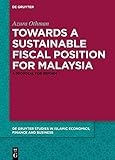Towards a Sustainable Fiscal Position for Malaysia : A Proposal for Reform / Azura Othman.
Material type: TextSeries: De Gruyter Studies in Islamic Economics, Finance and Business ; 11Publisher: München ; Wien : De Gruyter Oldenbourg, [2021]Copyright date: ©2021Description: 1 online resource (IX, 156 p.)Content type:
TextSeries: De Gruyter Studies in Islamic Economics, Finance and Business ; 11Publisher: München ; Wien : De Gruyter Oldenbourg, [2021]Copyright date: ©2021Description: 1 online resource (IX, 156 p.)Content type: - 9783110587791
- 9783110588026
- 9783110591187
- 339.5209595
- online - DeGruyter
- Issued also in print.
| Item type | Current library | Call number | URL | Status | Notes | Barcode | |
|---|---|---|---|---|---|---|---|
 eBook
eBook
|
Biblioteca "Angelicum" Pont. Univ. S.Tommaso d'Aquino Nuvola online | online - DeGruyter (Browse shelf(Opens below)) | Online access | Not for loan (Accesso limitato) | Accesso per gli utenti autorizzati / Access for authorized users | (dgr)9783110591187 |
Browsing Biblioteca "Angelicum" Pont. Univ. S.Tommaso d'Aquino shelves, Shelving location: Nuvola online Close shelf browser (Hides shelf browser)
Frontmatter -- Preface -- Contents -- 1 Introduction -- 2 Fiscal Policy and Sustainability -- 3 Studies on Fiscal Sustainability -- 4 Data Description and Modelling -- 5 Empirical Analysis -- 6 Policy Recommendation -- References -- List of Figures -- List of Tables -- Appendix A Implementation of GST in Malaysia -- Appendix B Sources of Data -- Appendix C Derivation of Fiscal Sustainability Index -- Appendix D Islamic Worldview of the Economy -- About the Author -- Index
restricted access online access with authorization star
http://purl.org/coar/access_right/c_16ec
The financial crisis of the last decade has brought to the fore many discourses on the stability of the financial system under the current interest rate regime and whether issuing more debts, that create further divergence between the financial and real sector of the economy, is a sustainable solution to the ensuing debt crisis that followed. Invigoratingeconomic development may need more than just achieving mere growth in GDP numbers and other mainstream macroeconomic key performance indices. Social equity, environmental conservation, inclusive development, and equitable income distribution are concepts that are increasingly given more weight in the measurement of economic development. The onset of the pandemic of the current decade has further emphasized the importance of these considerations as well as the concept of sharing of risks and return. This book analyses the past and current fiscal situation in Malaysia and identifies areas of improvements in the current tax system and public sector financing in generating the required revenue and financing government expenditure. The alternative fiscal framework proposed in this book covers a tax structure that features a simple and fairer tax system that is based on the ability to pay and public financing which is free of interest and provides opportunity for broader participation of the public. As Malaysia has a comprehensive framework as well as firm regulatory and government support for Islamic finance, the fiscal reform builds on an important feature of risk sharing Islamic finance that brings the real and financial sectors of the economy close together. The fiscal policy reform recommended in this book seeks to address the public debt burden, expand fiscal space, increase financial inclusion, reduce income and wealth disparities, increase employment and income for the growing population and ultimately improve social solidarity especially for a pluralistic country such as Malaysia.
Issued also in print.
Mode of access: Internet via World Wide Web.
In English.
Description based on online resource; title from PDF title page (publisher's Web site, viewed 28. Feb 2023)









